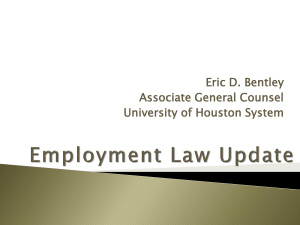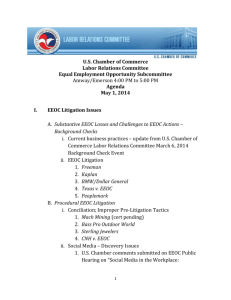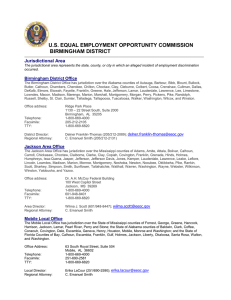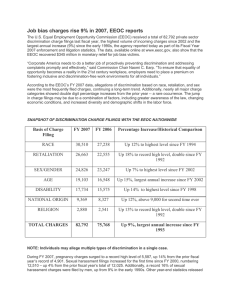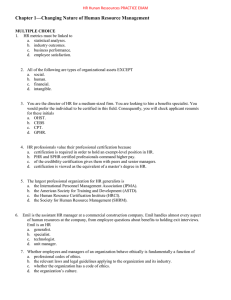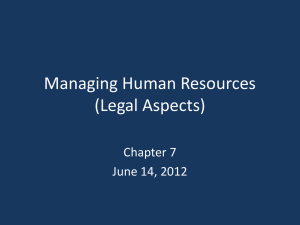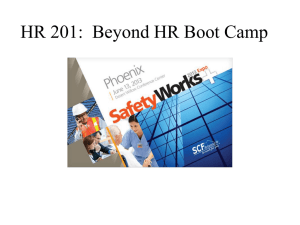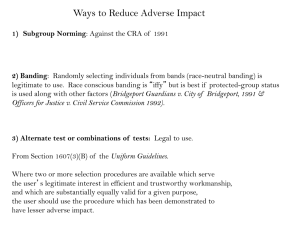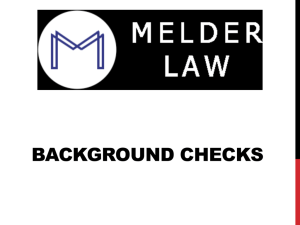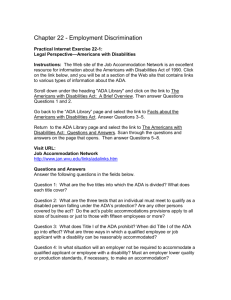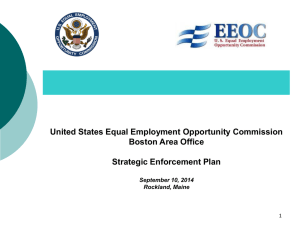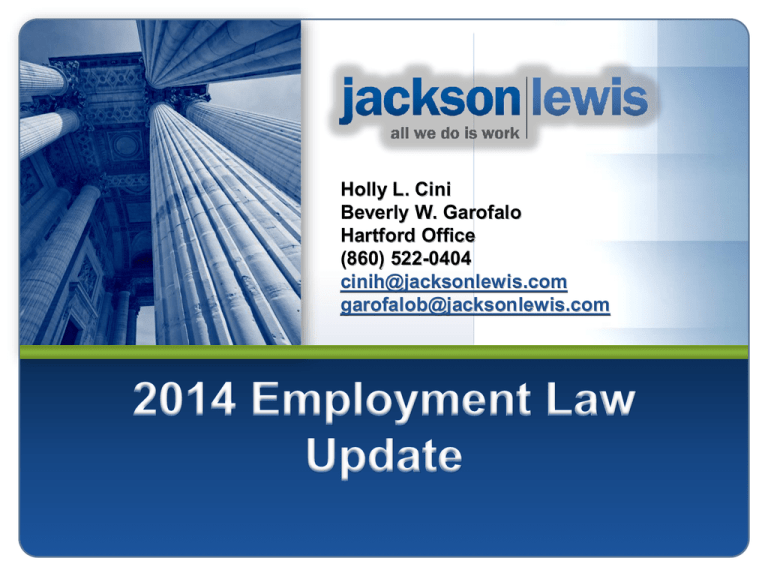
Holly L. Cini
Beverly W. Garofalo
Hartford Office
(860) 522-0404
cinih@jacksonlewis.com
garofalob@jacksonlewis.com
2
Overtime considerations
Individual employee preferences
Injuries - Workers’ Compensation
Social media
Dress code
3
2146 new claims filed in FY ’13-’14 (July 1, 2013-June 30, 2014)
16% increase over previous year (1850)
Closed 2303 cases as compared to 2146 opened
97 dismissed on MAR determination (vs. 800 ten years ago)
935 settled (vs. 481 ten years ago)
Disability claims up 3%, more than any other protected class
4
93,727 charges filed in FY 2013, a 5.7% decrease (99,412 last
year)
294 CT claims (53% increase in last five years)
Retaliation claims still most pervasive - 41.1%
Race, sex (including sexual harassment and pregnancy),
disability next
5
Minimum Wage (P.A. 14-1)
$9.15/hour on 01/01/15
$9.60/hour on 01/01/16
$10.10/hour on 01/01/17
Highest minimum wage of any state in the nation as of 2017
6
Paid Sick Leave law (H.B. 5269; eff. 01/01/15)
Revises method of calculating threshold for applicability from
quarterly to October 1;
Prohibition on terminating or transferring employees to another job
site to come under the 50-employee threshold;
Allows for accrual calculation on whatever 365-day year employers
choose to use, vs. the current requirement that it run on a calendar
year (Jan. 1 – Dec. 31) cycle;
Adds radiologic technologists to the list of “Service Workers”
7
• P.A. 14-159 (eff. Jan. 1, 2015) - Allows for a “sleep time”
exclusion from overtime pay requirements for certain
employees employed by third-party providers such as home
care agencies (“companionship services”);
• P.A. 14-9 – Expands the types of deposits that automatically
exempt up to $1,000 from bank executions against a judgment
debtor’s account to include electronic direct deposits that are
readily identifiable as wages
• P.A. 14-109 – Expands the types of employers who can require
a credit check on employees/applicants to include mortgage
servicing companies and brokers.
8
Imposition of a punitive tax on employers with 500+ employees for
each non-exempt employee paid less than 130% of minimum wage
(HB 5069);
Requirement that retailers pay non-exempt employees who work on
Thanksgiving or Christmas day 2.5 times their normal hourly rate
(HB 5280);
Proposal to create a new state-run Roth IRA plan that would require
employers with 5+ employees that do not offer a similar benefit to
participate (SB 249);
Elevating “unemployed” to a protected class status (HB 5054 and
5274)
9
“Congress enacted the Pregnancy Discrimination Act
(PDA) in 1978 to make clear that discrimination based on
pregnancy, childbirth, or related medical conditions is a
form of sex discrimination prohibited by Title VII. Thus, the
PDA extended to pregnancy Title VII’s goals of [achieving]
equality of employment opportunities and remov[ing]
barriers that have operated in the past to favor an
identifiable group of . . . employees over other employees.”
– EEOC Commissioner Chai R. Feldblum, July 14, 2014.
Young v. United Parcel Service, No. 12-1226 – Certiorari
granted July 1, 2014; to be decided by USSC in 2015
session
10
EEOC’s top systemic enforcement priorities:
o Investigation of “systemic barriers” in recruitment and
hiring, including pre-employment tests & assessments:
• criminal History Background Checks, Credit Checks
• personality Profiles, Behavioral Assessments
• cognitive Ability Tests
• structured Interviews
• physical Requirements
o Systemic pay discrimination
11
EEOC v. Supervalu, Inc. and Jewel-Osco, (N.D. Ill July
2014) – EEOC sued claiming violation of the ADA. In 2011,
the parties entered a 3 year consent decree to resolve the
case. One year later, EEOC filed a second claim, alleging
the employer did not adhere to the consent decree as to 3
employees.
EEOC v. UPS (N.D. Ill. March 2014) – EEOC sued claiming
a UPS policy that calls for “employee separation” after 12
months of leave violated the ADA. Is attendance an
essential job function?
12
Sandifer v. United States Steel Corp.,134 S. Ct. 870 (2014)
Plaintiffs argued the time they spent changing into and out
of safety equipment should be compensable under the
FLSA because the safety equipment did not constitute
“clothes” within the meaning of the exemption.
USSC held for the defendant, finding that protective gear is
“clothing”, and the time spent “donning and doffing” is not
compensable by operation of the FLSA (29 U.S.C. §
203(o)).
13
Burwell v. Hobby Lobby Stores, No. 13-354 (2014):
For-profit employers that are closely-held
corporations (where more than 50% of stock is
held by 5 or fewer individuals) can opt out of the
Affordable Care Act requirements on contraceptive
coverage for employees.
14
New Regulations re: Vietnam Era Veterans’ Readjustment Assistance Act
“VEVRAA” (eff. March 24, 2014)
Prohibits federal contractors from discriminating in employment against
protected veterans, and requires affirmative action to recruit, hire, promote, and
retain these veterans.
Contractors with an AAP already in place on the effective date have
additional time to come into compliance with the AAP requirements.
This compliance structure seeks to provide contractors the opportunity
to maintain their current AAP cycle.
Hiring Benchmarks; Data Collection; Job Listings; Records Access
15
Escriba v. Foster Poultry Farms (9th Cir. Feb. 25, 2014)
An employer did not violate the federal Family and Medical
Leave Act for terminating an employee for violating its noshow, no-call policy, where the employee elected not to
take protected FMLA leave, even though the reason for the
employee’s need for time off would have been covered
under the statute
16
EEOC v. Ford Motor Co. (6th Cir. April 22, 2014)
In holding that allowing telecommuting may be a
reasonable accommodation, the Court noted: “[A]dvancing
technology has diminished the necessity of in-person
contact to facilitate group conversations. The world has
changed since the foundational opinions regarding physical
presence in the workplace were issued: teleconferencing
technologies that most people could not have conceived of
in the 1990s are now commonplace.”
17
American Express Co. v. Italian Colors Restaurant
Continuation of trend to strictly enforce arbitration
agreements.
o March 2014: 11th Circuit (Walthour v. Chipio Windshield Repair LLC)
o August 2013: 2nd Circuit (Sutherland v. Ernst & Young LLP)
Very limited grounds to invalidate class waiver
Strong dissent concerned about vindication of rights.
o May 2014: Walthour plaintiffs file cert petition asking Supreme
Court to consider whether the FLSA confers a non-waivable
substantive right to collective action, and whether the law
contains a congressional command barring the enforcement of
arbitration agreements or class action waivers.
18
Trend continues to increase, despite Nassar decision
• Inherently hard to defend;
• So many statutes with retaliation provisions
• Jury verdicts in retaliation cases are exploding:
o March 2014: St. Louis Circuit Court awards $7.2 million in punitive
damages to police officer who claimed retaliation for having complained
of sexual harassment
o March 2014: Illinois state court awards $3 million to Chicago State
University employee who claimed retaliation for reporting alleged
misconduct by top university officials.
o September 2013: California court affirms jury award of $4,650,000 in
favor of employee who reported wage and hour violations.
19
Orton-Bell v. State of Indiana, (7th Cir. July 21, 2014)
Plaintiff, a prison security guard, complained when she
learned 2 night-shift workers were having sex on her desk.
Her manager suggested she should “probably wash off her
desk every morning” in response
The court held there was no evidence to support a hostile
environment claim because had the office belonged to a
man, it likely would have been used in the same manner,
and therefore the act was not a result of her gender.
20
21
Edwards v. Nicolai (NY, Case No. 160830) - Plaintiff, a Manhattan yoga
instructor, is claiming gender discrimination after being told she was fired
for being “too cute.” Her manager (a Playboy playmate) let her go
because her manager’s husband found Plaintiff attractive.
(Reminiscent of the 2012 in an Iowa Supreme court ruling of Nelson v.
Knight, in which case a dental assistant was fired for being “too sexy” for
the employer and the court dismissed the claim, ruling that it was her
attractiveness and not her gender, that prompted
the decision).
22
Sarrazin v. Coastal, Inc. (Conn. S.C. April 2014)
Plaintiff, a plumbing foreman, sought to be compensated
for commuting time because he carried his tools to and
from the workplace with him.
The CT Supreme Court disagreed and found against
Plaintiff, but in so doing rejected the CT DOL’s
interpretation of how to apply “travel time” requirements
under CT law, leaving open the question of whether the CT
DOL’s “Guide to Wage & Workplace Laws” is a reliable
resource
23
• USSC rules the recess appointments were invalid (June 2014), and
therefore likely all decisions made by those individuals are invalid
• Gave a thumbs up to employees who use the “Like” button on FB to
endorse comments about the workplace (August 2014)
24
• Still scrutinizing workplace policies for Section 7 violations:
“ We will not make negative comments about our fellow team
members” and “We will not engage in or listen to negativity or
gossip” in a Values Policy deemed unlawful;
Policy requiring employees to maintain confidentiality of
personnel information, including home and cellphone numbers,
deemed unlawful;
Car dealership’s policy calling for “courtesy” deemed unlawful;
General Counsel still commenting on “at-will” disclaimer
language
25
President Obama has issued a number of Executive
Orders with impact on workplaces nationally, including
those related to:
LGBT as protected classes;
Minimum Wage increases;
Arbitration Agreements prohibitions
Also circulating a “Pledge” for companies
to commit to adopting flex policies
26
27

